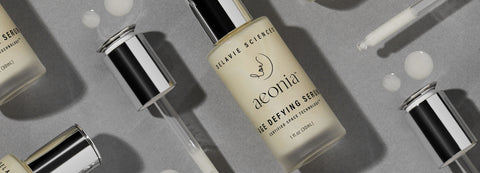WHAT IS COMEDOGENICITY?
If you have ever shopped for skincare, you most likely have come across the term non-comedogenic. Products deemed non-comedogenic are those designed to not block pores. These products tend to be a necessity for those that are prone to acne, skin pore blockages, and oily skin. On the other hand, comedogenic products are those that can cause comedones, or blocked pores.
In order to fully understand why noncomedogenic products are important, it is necessary to learn what clogged pores are and why they form. They develop when oil, dirt, or dead skin cells become trapped in the pores, which are small openings in your skin that release sweat and oil from the glands. Clogged pores are most common on the face, but they can occur anywhere on the body. They are extremely common, as they are the leading cause of acne which affects 50 million people each year.
Key Ingredients in Noncomedogenic Products
The next time you are looking for a new skincare product, check the ingredients list! Knowledge is power, and understanding what a product does can make a distinct difference in the overall appearance and performance of your skin. Contrary to popular belief, there are a few oils that are noncomedogenic, such as grapeseed oil, sunflower oil, and hempseed oil. Additionally, ingredients to avoid when thinking about maintaining a noncomedogenic skincare routine are: isopropyl myristate, sodium chloride, synthetic fragrances, lanolins, and D&C red dyes. While this ingredient search may not seem necessary, it is beneficial to be knowledgeable about what is going on your skin. The ingredients listed prior are only a few of many that are pore-clogging.
A Misconception of Skincare: Oils
Many skincare consumers have the same assumption that all oils create acne, which pushed the creation of oil-free products to appeal to those with oily skin. But some oils have a lower risk of causing comedones, such as jojoba oil. Because of this, it is possible for a noncomedogenic product to have oil, and an oil to be noncomedogenic. Alternatively, an oil-free product can still be comedogenic. So, prioritize noncomedogenic products and be mindful of all ingredients, not just oils.

Noncomedogenic at its Finest: Aeonia
At Delavie Sciences, we pride ourselves in tailoring our products to all skin types. The Aeonia Age Defying Serum is noncomedogenic to ensure that each of our consumers feel that their skin needs are met. For example, this product contains ingredients such as niacin (vitamin B3), glycerin, and jojoba esters, all of which are noncomedogenic and beneficial to the skin barrier. Additionally, all Aeonia products are tested by dermatologists to bring assurance that the wellness of the consumer is of our utmost priority. Click here to learn more about the ingredients behind the Aeonia Age Defying Serum.
References:
"Clogged Pores," Cleveland Clinic
"What Noncomedogenic Means in Skin Care Products," healthline
"What are noncomedogenic skin care products?" MedicalNewsToday



